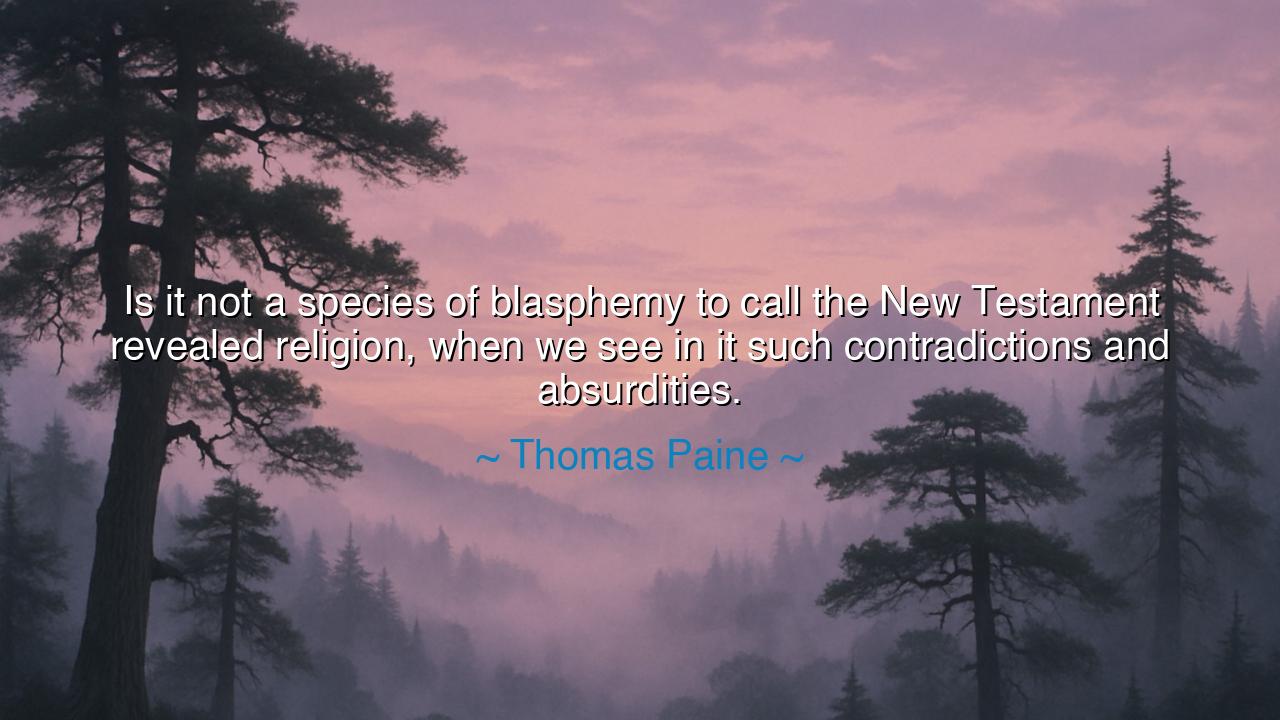
Is it not a species of blasphemy to call the New Testament
Is it not a species of blasphemy to call the New Testament revealed religion, when we see in it such contradictions and absurdities.






In the age-old struggle between faith and reason, a voice emerged from the annals of history, challenging the foundation of what many held to be sacred. Thomas Paine, a man of profound intellect and daring conviction, dared to question what others accepted without scrutiny. His words, spoken in the midst of the 18th century’s Enlightenment, echoed through time: "Is it not a species of blasphemy to call the New Testament revealed religion, when we see in it such contradictions and absurdities?" These words were not merely an attack on a sacred text but a call to the rational mind to examine and question what had been passed down through centuries as divine truth.
Paine’s statement was more than a mere critique of the New Testament. It was a challenge to the very idea that religion, in its highest form, should be above reproach. For many in his time, the New Testament was considered the cornerstone of Christian belief, regarded as divinely inspired and infallible. Yet Paine, with the sharp eye of reason, pointed to the contradictions and absurdities within its pages. He questioned the notion of divine revelation itself, asserting that the inconsistencies in the text were not signs of divine wisdom but evidence of human error. In his eyes, the blasphemy lay not in questioning the text but in accepting it without challenge, in blind adherence to contradictions that undermined the very essence of reason and logic.
The origins of this statement can be traced to Paine's larger work, The Age of Reason, where he sought to liberate mankind from the shackles of superstition and dogma. Paine was not an atheist, but a deist who believed in a rational, ordered universe created by a higher power. Yet, for him, religion must stand up to the scrutiny of reason. He argued that blind faith, especially when it led to contradictions, weakened the very foundations of belief. His rejection of the New Testament’s contradictions was, in his view, an attempt to elevate religion to its rightful place—one where it was not based on absurdities but on universal truths that could withstand the test of time and reason.
Consider the many contradictions that Paine might have been alluding to. In one passage, the New Testament portrays Jesus as the Son of God, but in another, he is shown as fully human. The idea of the Trinity itself—Father, Son, and Holy Spirit—remains a concept that is both difficult to grasp and inherently paradoxical. These are the very contradictions Paine questioned, asking why a divine being would present itself through a text that confounded its own message. To Paine, this was not the language of revelation but of human authorship, fraught with the inconsistencies and imperfections of its creators.
In his day, Paine’s ideas were not met with open arms. Many who revered the New Testament as the ultimate truth found his writings deeply offensive. To question the validity of their sacred scriptures was to challenge their very way of life. Yet, Paine’s insights into the nature of religion, particularly how it could be manipulated to control and constrain human thought, have continued to resonate through the ages. It is not merely the text of the Bible that he was addressing, but the very nature of religious authority that demands unquestioning belief, no matter the contradictions it presents.
The lesson in Paine’s words is not one of outright rejection of faith but rather an invitation to seek a higher understanding, one that is not bound by contradictions. Faith and reason need not be enemies; rather, they can coexist in a way that elevates both. But only through the courage to question, to seek clarity, can one begin to discern the true nature of both religion and the world around us.
In our own lives, we must embrace the challenge to examine deeply what we believe and why we believe it. Whether in religion, philosophy, or any other aspect of life, we must be willing to face the contradictions that may lie hidden in our convictions. Let us, as Paine urged, bring reason to bear on our understanding of the world and strive to live in accordance with truths that are consistent, clear, and just. For it is through such questioning that humanity can grow and evolve, both in its understanding of the divine and in its pursuit of wisdom.
Thus, Paine’s message, though spoken in a time of great turmoil, remains timeless. It is a reminder that to truly live by our beliefs, we must be ever watchful, ever questioning, and ever seeking the truths that lie beneath the surface of accepted wisdom.






AAdministratorAdministrator
Welcome, honored guests. Please leave a comment, we will respond soon